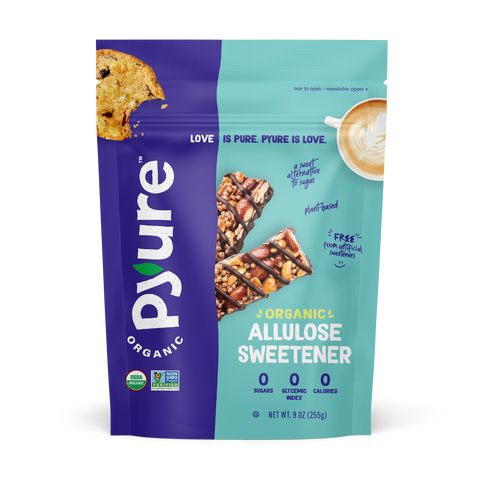
A Comprehensive Guide to Choosing Between Allulose and Erythritol
In the pursuit of wellness-conscious dietary choices, the debate over sugar substitutes has heated up. Allulose and erythritol, two prominent players in the sweetener game, have garnered attention for their low-calorie nature and low glycemic index.
Let's dive into the differences between allulose and erythritol, exploring their taste, texture, and culinary applications. With this knowledge, you can make informed decisions as you choose your low-cal sweetener.
What is Allulose?
Allulose, a rare monosaccharide found in fruits like figs, is a new sweetener with some interesting benefits. Discovered a couple of decades ago, it's become popular because it's very low in calories, about 90% less than regular sugar. This makes it a great option for people watching their weight or managing their blood sugar.
Allulose also doesn't have much impact on blood sugar levels because your body doesn't fully metabolize it. This makes it a good choice for people managing their glycemic response. Plus, allulose enhances the texture and mouthfeel of food, giving it a satisfyingly sweet taste without the downsides of sugar. As the demand for healthier choices of sweetener alternatives grows, allulose stands out as a promising option. It's a natural, low-calorie alternative that adds sweetness to food without the net carbs and extra calories.
What is Erythritol?
Erythritol, a popular sugar substitute, is gaining traction in the wellness world for its unique qualities. It's naturally found in small amounts in fruits like grapes and melons, but it's mostly made through a corn fermentation process. With approximately 70% of the sweetness of sucrose (table sugar), erythritol distinguishes itself by delivering sweetness without caloric burden.
This makes it a remarkable solution for people who are wellness-focused or managing their glycemic response. It’s non-glycemic, easy to digest, and won't harm your teeth. That's why it's become a top choice for those looking to cut calories and sugar without sacrificing sweetness.
Allulose vs Erythritol: Differences
To navigate this sugar-free terrain effectively, let's cover the key distinctions between allulose and erythritol, examining factors such as caloric content, origins, metabolic impact, taste, and culinary applications. This information will empower you to make informed choices that align with your dietary preferences and wellness goals.
Caloric Content
Allulose
While allulose provides sweetness similar to traditional sugar, it contributes minimal calories to the diet, containing approximately 90% fewer calories than sucrose.
Erythritol
Erythritol is a sugar alcohol with almost zero calories, making it an attractive option for those looking to reduce calorie intake while still enjoying sweetness.
Origins and Natural Occurrence
Allulose
Naturally occurs in small quantities in certain fruits like figs and raisins, and it can also be commercially produced from sources like corn.
Erythritol
Naturally found in small amounts in some fruits, but commercially produced through the fermentation of glucose, often sourced from corn. Pyure’s erythritol is sourced from Non-GMO corn specifically.
Metabolism and Blood Sugar Impact
Allulose
Absorbed by the body but not metabolized, allulose is suitable for those opting for low glycemic index sweeteners.
Erythritol
Virtually non-glycemic and does not raise blood sugar levels, making it a great choice for those on keto or low glycemic index diets.
Taste and Mouthfeel
Allulose
Provides a sweetness similar to sucrose with no noticeable aftertaste. Additionally, it contributes to the texture and mouthfeel of foods, mimicking the characteristics of sugar.
Erythritol
Can have a cooling sensation on the palate and a slight aftertaste, which varies among individuals. Its granulated form is often used as a sugar substitute in baking.

Cooking and Baking with Allulose and Erythritol
For wellness-conscious individuals seeking a versatile alternative to traditional sugar, allulose and erythritol emerge as game-changers in the culinary realm. Allulose, with its remarkable ability to mimic the moisture and sweetness of sucrose, takes center stage in the world of baked goods. It seamlessly integrates into recipes, delivering a desirable texture without excess calories. However, when crafting confections with allulose, a keen eye is essential as its browning properties may differ slightly from sugar, requiring attentive monitoring during the baking process.
On the other hand, erythritol, with its granulated form, reigns supreme as a baking staple, renowned for its ability to replicate the structure and texture of sugar. Yet, bakers should be mindful of erythritol's cooling effect, which can subtly influence the overall taste profile of certain recipes.
In the realm of cooking, both allulose and erythritol seamlessly blend into sauces and dressings, providing a low-calorie alternative without compromising flavor. When embarking on culinary experiments with these sweeteners, it's advisable to start with small quantities, gradually adjusting to personal taste preferences. Additionally, combining these sweeteners with other low-calorie options or traditional sugar substitutes can yield a well-rounded flavor profile.
In essence, allulose and erythritol empower home cooks to indulge their sweet tooth without sacrificing taste, ushering in a new era of culinary delights. With these sweeteners as their companions, home cooks can embark on a journey of culinary creativity, crafting delectable treats that are both lower calorie and satisfying.
Which sweetener is right for you?
Choosing between allulose and erythritol depends on your preferences, diet goals, and cooking needs. Allulose works well for mimicking sugar's texture, making it great for baking without spiking blood sugar levels. Erythritol is versatile and has almost no calories, making it popular in different recipes, but some might not like its cooling effect. Additionally, erythritol can be more available and cost-effective, making it a practical choice for those on a budget.
Pyure, a trusted brand of both keto sweeteners, offers the option to try their Pyure Organic Allulose Sweetener or Pyure Organic Erythritol sweetened products. Or, for those seeking a customized sweetness, experiment with a combination of both, creating a balanced and satisfying solution tailored to your personal taste and dietary preferences.

